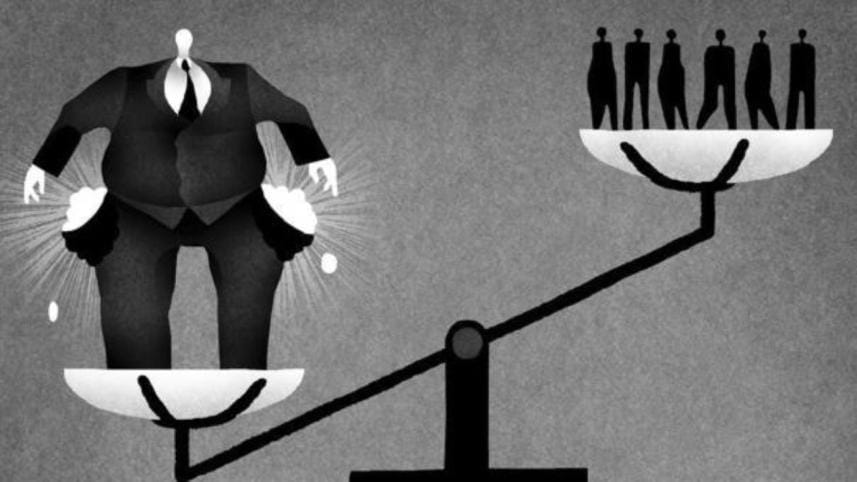Income inequality resulted in dual economy

Income inequality and discrimination in the country rose in such a way that it seems that there is a dual economy, said a noted economist yesterday.
"This is no way to build an inclusive economy," said Mustafizur Rahman, distinguished fellow of the Centre for Policy Dialogue (CPD).
A dual economy was in existence when Bangladesh was known as East Pakistan and was yet to gain independence from West Pakistan before Bangladesh's freedom fighters lay down their lives for a country with an inclusive economy.
Now a dual economy has arisen again, Rahman said.
He added that there is rising unemployment, with as much as 25 percent of fresh graduates of the National University of Bangladesh remaining unemployed.
He also suggested the government increase direct taxes on wealthy people so that people with low incomes need not be overburdened with tax.
During the pandemic, the highest rate of income tax was lowered to 25 percent considering that those were tough times, but three years on, the rate has not been revised to the previous 30 percent, Rahman also said.
It is expected that the government will increase such direct taxes again in the upcoming national budget for fiscal year 2024-25, he added.
Rahman was speaking at a discussion on "Macroeconomic stability and next budget" organised by Economic Reporters' Forum (ERF) at its office in Dhaka.
Anwar Ul Alam Chowdhury Parvez, president of the Bangladesh Chamber of Industries (BCI), said the cost of doing business increased manifold for different reasons.
For instance, gas prices have increased by nearly 178 percent but adequate supplies have not yet been ensured to industrial units, he said.
Many micro, small and medium enterprises used to offer jobs to people but now they cannot run their units because of the high cost of business, he said.
He also alleged that customs and other branches of the National Board of Revenue were harassing businesspeople.
Parvez also sought credible export data, pointing out that the Export Promotion Bureau was saying that export earnings stood at $32 billion while customs said it amounted to $26 billion.
Shams Mahmud, managing director of Shasha Denims, said there are 750 small and medium-sized garment factories which may face challenges because of the rising cost of doing business.
He suggested that the government hold negotiations with India so local exporters can export goods with duty benefits.
Former senior finance secretary Mahbub Ahmed suggested that the government raise allocation in sectors such as health, education, agriculture, and skills development.
State Minister for Finance Waseqa Ayesha Khan said the private sector was very important for the economy and the government always consulted private sector stakeholders before taking any decision.
She said the government has been availing opinions of the private sector for the preparation of the next budget.
The government has also been providing incentives to different sectors for many years and some of the sectors are now capable enough to be more competitive and may not need incentives anymore, she said.
ERF President Mohammad Refayet Ullah Mirdha chaired while General Secretary Abul Kashem moderated the discussion, which was attended by businesspeople, economists and journalists.



 For all latest news, follow The Daily Star's Google News channel.
For all latest news, follow The Daily Star's Google News channel.
Comments